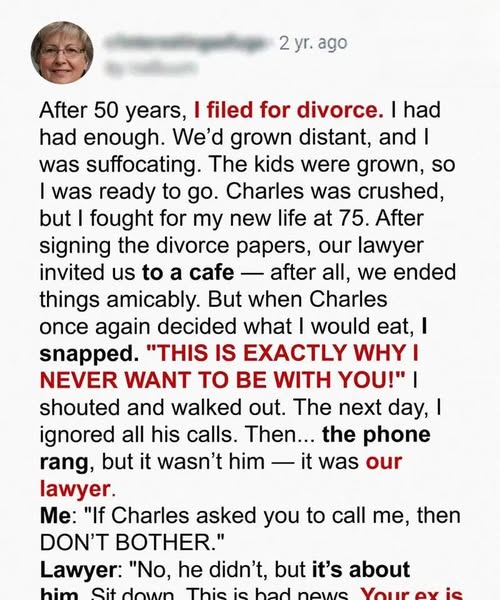Charles and Mina had reached the quiet, inevitable conclusion of a fifty-year marriage. Fifty years of mornings together, evenings together, birthdays, holidays, and uncounted ordinary moments—the kind that settle into the bones and become nearly invisible. They signed the divorce papers with a calmness that masked decades of shared history: meals cooked and burnt, books read side by side, arguments about nothing and everything, hands held in comfort and in anger. There were no shouting matches in the lawyer’s office, no tears spilling onto the glossy table. Just the scratch of pens on paper, the faint click of signatures landing in place, sealing a life that had been both sanctuary and cage.
Lunch followed the procedure, more out of habit than appetite. They went to the small café around the corner from the courthouse, the place where they had celebrated anniversaries and mourned losses alike. Charles ordered for her automatically, as if fifty years of knowing her tastes and preferences could not be undone in a single signature. The server brought the plate, and the smell of her favorite dish—spiced just the way she liked it—hit her senses. That tiny, automatic gesture—a habit born of love and routine—broke something inside her. She felt a weight lift at the same time as a suffocating nostalgia pinched her chest. Without a word, she pushed back from the table, left her untouched plate, and walked out into the sunlight that felt impossibly bright, tasting a strange, exhilarating freedom. Her legs carried her almost on instinct, walking streets that now seemed wide and open, roads no longer paved with invisible chains.
The clarity of freedom, however, proved fragile. Hours later, her phone rang with a trembling urgency she had not expected. It was the lawyer. “Mina,” he said, voice unsteady, “Charles… he collapsed. He’s had a stroke.”
Time froze. Freedom transformed into a crushing fear. The world tilted, and she felt herself stumbling on the narrow edge between loss and duty. She drove without remembering the traffic lights, the faces of strangers blurring past her window. The hospital was cold and impersonal, a place where machines hummed and beeped with the rhythm of lives hanging in balance. And there he was: Charles, the man she had loved fiercely and resented in equal measure, lying fragile on a narrow hospital bed, tubes and wires claiming him in ways neither had ever imagined.
She did not falter. She returned daily, lingering at the bedside long after visiting hours ended. She read to him from books they had once devoured together—stories of adventure, love, and human folly. She carried flowers from the small garden she tended, the scent of life brushing against the sterile air. She recalled anecdotes from decades past: the night they danced in the kitchen during a rainstorm, the argument about buying a house with too many stairs, the day their first child was born. She spoke softly, sometimes recalling funny stories, sometimes just sitting, letting her presence fill the room with a gentle constancy that mirrored years of shared life.
When Charles finally woke, there were no romantic fireworks, no tearful reunions. Instead, there was recognition—eyes meeting across a hospital room filled with beeping machines, both of them understanding without speaking that this man and woman had loved deeply, loved recklessly, and then, somewhere along the way, lost their way. Words were awkward at first, halting, but gradually grew smoother. They talked about mistakes, about regrets, about the quiet betrayals of everyday life. There were tears, yes, but also laughter—the kind that crests slowly and fills the lungs with relief, the kind that only comes from surviving the storms together and apart.
They did not remarry. That was not the point, nor would it have fit the people they had become. Instead, they repaired. Honest conversations became a daily practice. Laughter returned like sunlight through a long winter. And together, they established the Second Bloom Fund—a scholarship program dedicated to women over sixty who were starting over, whether from divorce, widowhood, or late-life career shifts. Their final act together replaced the shadow of regret with a deliberate, tangible grace, a legacy of care and empowerment beyond themselves.
Mina, for her part, discovered the profound strength in independence. She learned to garden, her hands covered in soil that smelled of rain and renewal. She learned to fix leaky sinks, to navigate her small apartment without assistance, to cook for herself in ways that were both practical and indulgent. She rediscovered herself at seventy-six—not as Charles’s wife, not as someone defined by decades of shared habit, but as Mina, in full, with all her accumulated wisdom and quirks intact.
Three years later, when Charles passed, he left behind more than memories. He left a letter, the paper soft and familiar beneath her fingers. He thanked her for returning—not to stay indefinitely, but to say goodbye properly, to honor what they had shared and the lives they had touched together. It was a letter heavy with acknowledgment, with gratitude, with the small poetry of an unspoken apology woven through decades of companionship.
Now, each year on his birthday, Mina visits their garden, the one they had nurtured together. She tends the roses, checks on the small vegetables, whispers into the wind the milestones of life she still witnesses: who married, what bloomed, which scholar graduated. Sitting on the bench that once held Charles, sunlight warming her hands and face, she feels the steady, unshakable peace of closure. She knows now that closure is not a finality marked by absence—it is a living, breathing serenity earned in the small, consistent acts of remembrance and gratitude, in conversations held with honesty and love, even after the heart has been broken and mended again.
And in that quiet sanctuary, amidst the rustle of leaves and the hum of life, Mina understands at last: the end of one story is never truly an end. It is simply the beginning of the grace with which we live the rest.
